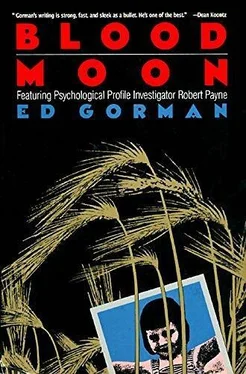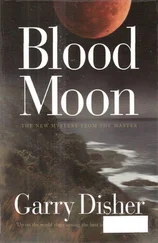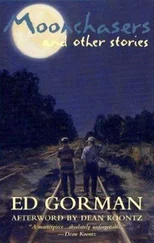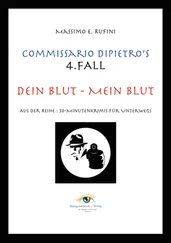“Right,” she said. “And I’m Katharine Hepburn.”
In the driveway sat two matching white Lincoln town cars. Brand-new. There was money in the God business. Far up the drive that curved behind a stand of pine trees, I could see a large white house, new and prosperous-looking against the backdrop of a pasture where cows loitered contentedly.
The church was small and modern in a repellent sense, all sharp angles and juts, like a piece of glass sculpture that had been dropped and smashed and then glued back together ineptly. The message seemed to be that God was a schizophrenic, and a clumsy one at that.
But for all the trendiness of the design, the wailing song that poured forth from its open front doors was at least as old as the famous tent-revival shows that played the Midwest and South back in Depression days, a bit of bayou blues and Jimmy Rodgers white-boy hobo song combined with the stirring religious themes of working-class Baptists.
For all the fanciness of the exterior design, the interior was plain: thirty rows of oak pews and an oaken altar. And on the altar stood a thirtyish man in a singles-bar country-western getup of brilliant red shirt with blue piping, skintight jeans and a pair of Texas boots that were no doubt the real lizard they purported to be. He was good-looking in a chunky Irish kind of way — maybe Edmond O’Brien had been his grandfather — and he was gone gone gone on the song he was twanging out on his electric guitar, Elvis himself having never been more gone gone gone back when he was nineteen and known only in Memphis and signing his name on the top part of ladies’ breasts.
He was singing all about how God understood him and why he did the things he did, and how God would cradle him someday and purge him of sin and loneliness and want, and I couldn’t help it — I actually enjoyed hearing him sing, his voice echoing off the vaulted ceiling and trailing out the open side windows.
And then he paid it off, a big finale with him working hard on his guitar, eyes still closed, whole body surging with the grief and ecstatic eternal promise of the lyrics.
The church sounded obscenely quiet after he finished, as if its only purpose was to be filled with his song, and now it was spent and empty of reason to exist.
“You’re really good,” I said.
For the first time, his eyes came open and I was almost startled by the clear green fury of them. Oh, yes, this man knew whereof the demons he sang.
“Didn’t know I had an audience,” he said in a young voice that made me slide his age down to twenty-five. “Reverend Roberts says I should bring in an audience even when I’m practicing. I still get stage fright, you know, on our TV shows and all.”
He set his blue Fender down on the carpeted floor of the altar, then walked down to meet me.
After shaking hands he said, “I’m Kenny Deihl. If you ever saw the reverend’s show, I’m one-half of the talent.”
“Haven’t seen the show, I guess.”
Something subtle but serious changed in his startling green gaze. “You’re not from around here, are you?”
“No, I’m not.”
“You’re not a follower of the reverend’s, either, are you?”
“No. Afraid not.”
“Then just what the heck’re you doing—”
“Kenny, I’ll handle this. No need to get upset We’re all children of the Lord.” He stood in the back of the church, but I had no trouble hearing his greased and mellifluous tones at all.
He looked just about the way you might imagine, $250 worth of moussed dark hair, a face that was youthfully handsome in an almost-diabolical way, like a mask that didn’t quite work, a conservatively cut blue suit that would give offense to no one, and one of those firm-handshake, quick-grin manners that let you know you were in the company of a Psycho for Jesus. He smelled of hair spray, aftershave and chewing gum.
He came over and said, “Kenny, why don’t you run downtown and pick up that case of Pepsi for tonight? You know how dry we get when we cut those radio shows.”
“I’ll bet he’s a reporter,” Kenny said. “I’ll just bet he is.”
“Remember Hebrews 13:2 , Kenny. ‘Do not neglect to show hospitality to strangers, for thereby some have entertained angels unaware.’ ”
Kenny knew just what look to put on his face. He still hadn’t forgiven me for coming here but he knew how to take his cue from the reverend. “Sorry, mister. Guess I just got carried away. Just after the state paper went after us—”
He looked at the reverend, then quit talking. He shrugged, then walked to the side door at the front of the church and disappeared.
“When I found him two years ago,” said the minister, “he was singing in a motel lounge in Sioux City. He’s changed a lot since then, become a truly saved soul, but he has a distrust of strangers ever since the state newspaper did a very unflattering article about myself and two other midwestern TV evangelists. Kenny takes criticism of me especially hard. When you save a man’s soul, the way I saved Kenny’s, well, he’s naturally grateful to you and he gets very protective of you.” He shook his perfectly moussed head. He resembled an actor who might have been a leading man a quarter-century ago. “The Devil has so many friends, and the Lord so few.”
“Well,” I said. “That’s actually what I am — Kenny guessed right — I’m a journalist. But I’m not doing an exposé. I’m doing a piece on how small towns are becoming bedroom communities for a lot of people.” I told him who I was profiling here.
“Well, Mr. Hokanson, I’m sure you’re telling me the truth, that you’re not going to do an exposé and all, but I think you’ll understand why I may not want to do an interview with you.”
“You’ll see the copy before it gets printed.”
“That’s what the other fellow said, too.”
“How about you think it over for a while, and I’ll call you back tonight?”
“Why don’t you tell me where you’re staying, and I’ll leave a message there? We’re on thirty-eight radio stations in a three-state area, and we have to cut half-hour radio shows once a week. I give a sermon, and Kenny does two songs, and then Mindy does two songs. Then, of course, I ask for help, financial help, Mr. Hokanson, I’m not afraid to say those two words together. Financial help. You can’t do the work of the Lord without financial help. Nobody can — it costs money to live in Satan’s world, Mr. Hokanson. That’s what that reporter fellow couldn’t understand, that virtually every dime donated to my church goes to helping other people.”
I tried hard not to think of the matching white Lincolns in the driveway.
The good reverend suddenly made a bitter face. “He even mocked me, that reporter. I was trusting enough to tell him about my wife, who has cervical cancer, and about our trips up to the Mayo Clinic and about how I’d nearly lost my faith several times when I saw — through the test results — that my Betty wasn’t getting any better. Wasn’t that a legitimate question? To ask the Lord why He answered so many of my prayers for others who were sick — but wouldn’t answer my prayers for my own wife?”
Tears stood in his eyes now, and spittle sprayed from his mouth, and he made kind of animal mourning sounds deep in his chest.
He started poking me in the chest as he made his point.
“I say to people, ‘The Lord hasn’t answered me because I’ve been a sinner’ and they say, ‘Oh, no, Reverend Roberts. Nobody lives a more exemplary life than you. It can’t be that.’ ‘Then why won’t he help Betty get better?’ I ask. But they never know what to say. So you see, it’s got to be my sins. I am a sinful man.”
Читать дальше









